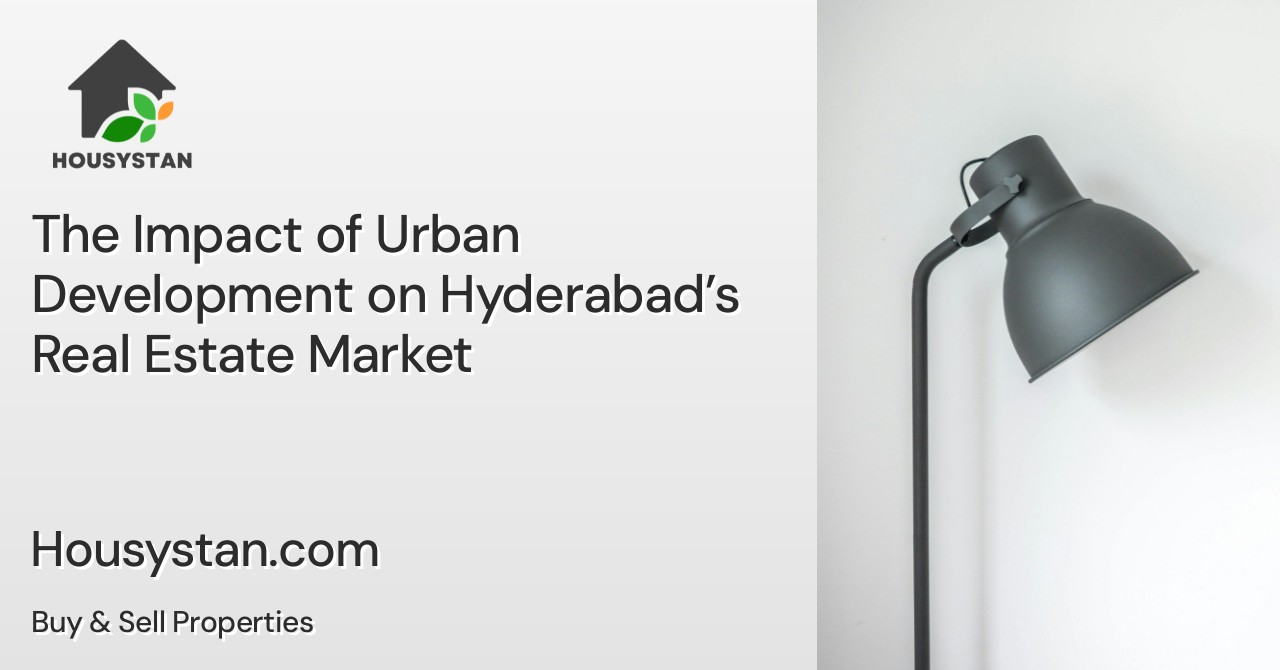The Impact of Urban Development on Hyderabad’s Real Estate Market
Read latest blogs and articles from Housystan

The Information mentioned here was last updated on:
21/2/2026The Impact of Urban Development on Hyderabad’s Real Estate Market
Introduction: Hyderabad’s Transformation Through Urban Development
Over the past decade, Hyderabad has emerged as one of India’s fastest-growing cities, drawing attention from both domestic and international investors. The city’s real estate market is undergoing a significant transformation, largely attributed to ambitious urban development initiatives. From innovative infrastructure projects to the expansion of tech corridors, Hyderabad is redefining its urban landscape, propelling demand and shaping the future of its property market.
- Verified Tenants/Buyers
- Unlimited Property Listing
- Zero subscription/charges fee
Hyderabad’s Urban Development: A Catalyst for Growth
Urban development in Hyderabad encompasses a broad spectrum of projects: metro rail expansions, new flyovers, smart city projects, and the creation of integrated townships. These initiatives are designed to address the challenges of rapid urbanization, improve connectivity, and provide sustainable solutions for a burgeoning population. The Greater Hyderabad Municipal Corporation (GHMC) and Telangana government have been at the forefront of this transformation, focusing on infrastructure upgrades that directly impact real estate dynamics.
The Rise of Residential Real Estate
One of the most visible effects of urban development is the surge in residential real estate. Improved infrastructure, such as wider roads and efficient public transport, has made previously inaccessible suburbs attractive for homebuyers. Areas like Gachibowli, Kondapur, and Miyapur have witnessed a boom in housing projects, from affordable apartments to luxury villas. This growth is not just quantitative; developers are emphasizing amenities, sustainability, and community living to cater to evolving consumer preferences.
Commercial Real Estate: Tech Hubs and Business Corridors
Hyderabad’s reputation as a technology and business hub has been reinforced by urban development. The HITEC City and Financial District have become magnets for IT giants, multinational corporations, and startups. The development of Grade-A office spaces, co-working hubs, and business parks is fueling commercial real estate demand. This influx of businesses is also driving job creation, which, in turn, stimulates the residential sector and supports a robust rental market.
Infrastructure Projects Shaping Property Values
Major infrastructure projects are playing a pivotal role in redefining property values across Hyderabad. The metro rail network, Outer Ring Road (ORR), and elevated corridors have significantly reduced travel time, enhancing the appeal of peripheral locations. Connectivity to the Rajiv Gandhi International Airport has spurred developments in Shamshabad and surrounding areas. These projects contribute to the appreciation of land and property values, benefiting both investors and homeowners.
Sustainable Urban Planning and Its Influence
With environmental concerns gaining prominence, sustainable urban planning is taking center stage in Hyderabad’s development strategy. Green buildings, rainwater harvesting, energy-efficient construction, and integrated green spaces are becoming standard features in new projects. Such initiatives not only align with global sustainability goals but also attract environmentally conscious buyers and investors, adding another dimension to the real estate market’s growth.
Affordable Housing Initiatives
The Telangana government has launched several schemes to promote affordable housing, targeting lower and middle-income groups. Urban development authorities are collaborating with private developers to provide budget-friendly homes without compromising on quality or amenities. Areas on the city’s outskirts, such as Bachupally and Kompally, are emerging as hotspots for affordable housing, making homeownership a reality for a wider population segment.
Regulatory Reforms and Market Transparency
The implementation of the Real Estate (Regulation and Development) Act (RERA) and digitization of land records have enhanced transparency in Hyderabad’s property market. These regulatory reforms have boosted buyer confidence by ensuring accountability among developers and streamlining the approval process. As a result, there is a visible reduction in disputes and delays, strengthening the market’s credibility and attracting long-term investors.
Challenges Amid Rapid Urbanization
Despite remarkable progress, Hyderabad’s urban development journey faces challenges. Traffic congestion, water scarcity, and the need for upgraded civic amenities require continuous attention. Balancing fast-paced growth with environmental preservation and inclusivity remains a key focus for city planners. Addressing these concerns is crucial for sustaining investor interest and ensuring equitable growth across all city zones.
Real Estate Trends Shaped by Urban Development
Urban development has led to several notable trends in Hyderabad’s real estate market. There is a growing preference for integrated townships offering work, leisure, and living spaces within close proximity. The demand for gated communities and smart homes equipped with modern technology is on the rise. Additionally, there is a visible shift towards peripheral locations, driven by improved connectivity and competitive pricing, which is gradually decongesting the city’s core areas.
Future Outlook: Hyderabad’s Real Estate on a Growth Trajectory
The synergy between urban development and real estate is shaping a promising future for Hyderabad. Ongoing and upcoming projects, such as the expansion of the metro rail network and the development of new IT parks, are expected to further enhance the city’s attractiveness. Experts predict a steady appreciation in property values, especially in well-connected and infrastructure-rich corridors. As Hyderabad continues to attract businesses, talent, and investments, its real estate market is poised for sustained growth.
Conclusion: Urban Development as the Backbone of Hyderabad’s Realty Boom
Hyderabad’s real estate market stands at the intersection of opportunity and innovation, propelled by strategic urban development. Infrastructure upgrades, regulatory reforms, and sustainable planning are transforming the city into a preferred destination for homeowners and investors alike. While challenges persist, the collective efforts of government bodies, developers, and citizens are paving the way for a vibrant and resilient property market. For those eyeing long-term gains, Hyderabad’s evolving urban landscape offers a compelling canvas for investment and growth.